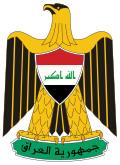- National Progressive Front (Iraq)
-
For the Syrian variant, see National Progressive Front (Syria).
Iraq 
This article is part of the series:
Politics and government of
IraqGovernment- Constitution
- Federal government
- President (List)
- Presidency Council
- Vice Presidents
- Prime Minister (List)
- Cabinet
- Current Government
- Kurdistan Regional Government
Legislative- Council of Representatives
- Speaker
- Kurdistan Parliament
Judicial- Iraqi High Tribunal
- Governorates
- Districts
Elections- Elections
- Electoral Commission
- Jan 2005 parliamentary election
- 2005 governorate elections
- Dec 2005 parliamentary election
- 2009 governorate elections
- 2010 parliamentary election
- Constitutional referendum
Political PartiesForeign Policy
The National Progressive Front (Arabic: الجبهة الوطنية التقدمية, al-Jabha al-Wataniyyah at-Taqaddumiyyah, NPF, sometimes known as the Progressive Patriotic and National Front) was an Iraqi Popular Front announced on July 16, 1973 and constituted in 1974, ostensibly formed within the framework of a "joint action programme" to establish a coalition between the Arab Socialist Ba'ath Party, the Iraqi Communist Party, the Kurdistan Revolutionary Party, a pro-government section of the Kurdish Democratic Party, and miscellaneous independents. The creation of the Front ensured the leading role of the Ba'athists in state and society whilst allowing limited autonomy for other participating parties loyal to the government. Iraqi leader Saddam Hussein spoke of it once as "one of the essential forms to voice our will and to deepen democracy and political participation of the people and the national forces in building the new experiment in all fields."[1] In effect the Front was controlled and maintained solely by the Ba'ath, with all other legal political forces acting in subservience to it.[2]
Its origins lay in July 1970 when the government under Ahmed Hassan al-Bakr, amid fighting the militant Iraqi Communist Party (Central Command) and dealing with Kurdish separatist militancy, offered the formation of the Front to moderate sections of the Iraqi Communists under conditions guaranteeing Ba'athist dominance over the state and political exclusivity within the armed forces.[3] To quell Kurdish separatist sentiment an autonomy agreement was agreed to in 1970 to create Iraqi Kurdistan while attempts were made to get the Kurdistan Democratic Party to join the Front in the 1973-1974 period.[4] This resulted in a majority section led by Mustafa Barzani continuing to rebel against the state while a smaller faction joined the Front.[5]
The Iraqi Communists, despite entry into the Front, continued to experience repression such as the arrest of factory members, execution of members within the armed forces, and strong censorship of the ICP's daily newspaper.[6] By 1979 the leadership of the ICP was either arrested or in exile, with the party itself formally withdrawing from the Front by 1980 to openly oppose the government.[7] In the 1995-2000 period a small pro-government Iraqi Communist Party led by Yusuf Hamdan was proclaimed and its existence was tolerated, though it was not a formal member of the Front.[8]
Upon the formation of Iraq's National Assembly in 1980 the Front was tasked with nominating candidates to stand in elections.[9] Throughout its existence the Secretary General of the Front was Naim Haddad. It was disbanded in 2003 following the overthrow of the Ba'athist Government in the Iraq War.[10]
See also
References
- ^ Bhim Singh. Iraq: A Heroic Resistance. New Delhi: Har-Anand Publications. 2001. p. 245.
- ^ Muhammad Faour. The Arab World After Desert Storm. Washington, D.C.: US Institute of Peace Press. 1993. pp. 40-41.
- ^ Nazih N. Ayubi. Over-Stating the Arab state: Politics and Society in the Middle East. London: I.B.Tauris. 1996. p 424.
- ^ Mahboob Alam. Iraqi Foreign Policy Since Revolution Second Ed. 1995. New Delhi: Mittal Publications. pp. 25-26.
- ^ David McDowall. A Modern History of the Kurds Third Rev. Ed. London: I.B.Tauris. 2004. p. 337.
- ^ Tariq Ali. Bush in Babylon: the Recolonisation of Iraq. London: Verso. 2004. p. 118, 121.
- ^ Taru Bahl and M.H. Syed (Ed.). Encyclopaedia of the Muslim World. New Delhi: Anmol Publications. 2003. p. 180.
- ^ Ilario Salucci. A People's History of Iraq: The Iraqi Communist Party, Workers' Movements and the Left, 1924-2004. Chicago, IL: Haymarket Books. 2005. p. 103.
- ^ Dieter Nohlen, Florian Grotz and Christof Hartmann (Ed.). Elections in Asia and the Pacific: A Data Handbook Volume I. New York: Oxford University Press. 2001. p. 88.
- ^ The Europa World Year Book 2004 Volume I. London: Taylor & Francis. 2004. p. 2200.
Categories:- Arab nationalist political parties
- Arab socialist political parties
- Political parties in Iraq
- Far-left politics
- Political parties established in 1972
- Political parties disestablished in 2003
- Popular fronts
Wikimedia Foundation. 2010.
